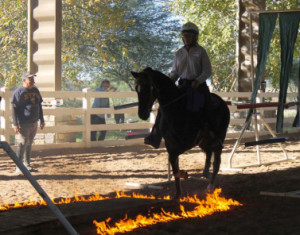Keeping Calm in Chaos – Mounted Police Horse Training
Click here to read the complete article274 – May, 2016
by Kristen Spinning
 “If you don’t know a single thing about horses, you probably still know enough to stay away from the back end of one,” drawls Bill Richey. “If you do know something about horses, you’re probably smart enough to stay away from the back end of one. Here’s the thing, that’s true even when somebody’s drunk and being stupid.” Richey pauses to let the laughter die down and the basic wisdom of his statement to settle in. He’s explaining the tactical and practical applications of mounted police officers to a class of civilians. He continues, “If you’re managing a rowdy crowd, or moving in to break up a fight, odds are pretty good that a bunch of those people are drunk, and the rest are certainly being stupid. There’s nothing more effective than a mounted officer to handle the situation.”
“If you don’t know a single thing about horses, you probably still know enough to stay away from the back end of one,” drawls Bill Richey. “If you do know something about horses, you’re probably smart enough to stay away from the back end of one. Here’s the thing, that’s true even when somebody’s drunk and being stupid.” Richey pauses to let the laughter die down and the basic wisdom of his statement to settle in. He’s explaining the tactical and practical applications of mounted police officers to a class of civilians. He continues, “If you’re managing a rowdy crowd, or moving in to break up a fight, odds are pretty good that a bunch of those people are drunk, and the rest are certainly being stupid. There’s nothing more effective than a mounted officer to handle the situation.”
Richey has vast experience and endless anecdotes to back up this statement after 30-plus years as a mounted police officer. Over the years, he has trained countless horses and riders to react calmly and effectively during very chaotic circumstances. These days, Richey travels the country and even flies abroad to teach these techniques to mounted police, Sheriff’s posses, mounted search and rescue teams, and enthusiastic horsemen. The rigorous and unique training necessary to ensure a horse will remain calm in out-of-the-ordinary scenarios on the police beat, will certainly be of help for situations encountered on the trail by a civilian rider.

Bill Richey spent much of his career on the Mobile, Alabama police force, and he served as the chief instructor for the Mobile Mounted Police Mardi Gras School. Richey states categorically that he has put more new mounted police horses in Mardi Gras than anybody else on this planet. Mobile is home to the oldest annual Carnival celebration in the US. Numerous parades with raucous bands and towering floats are held during the two weeks of festivities, and over 100,000 people crowd downtown streets. Therefore, Mobile maintains a highly-trained mounted force augmented by an active auxiliary to help keep the peace.
Horses perceive the world much differently than humans do. Richey contends that it’s vital to understand their thought process to know how your horse might react in a given situation as well as to learn what to do about it. He views the much touted “fight or flight reflex” as overly simplistic, saying, “They don’t fight; they run away. If all goes well, you’re still on their back. I start by teaching how horses see and everybody’s best guess as to how they think.”
Click here to read the complete article274 – May, 2016










